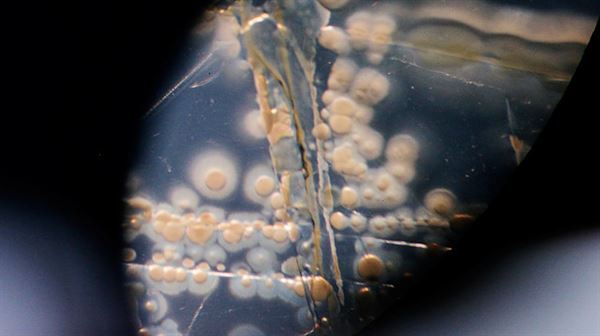Only 70 years after the introduction of antibiotics, a 20th century gift to humanity that can cure many would-be killer diseases, the world is now fac
Only 70 years after the introduction of antibiotics, a 20th century gift to humanity that can cure many would-be killer diseases, the world is now facing a new problem: antibiotic resistance.
Antimicrobial drugs, known as antibiotics, are medicines that fight bacteria by killing or stopping their growth.
Until the discovery of penicillin in 1928, people all over the world had been waging a losing battle against bacterial diseases such as meningitis, pneumonia, or post-operative infection.
According to a 2016 study by the U.S. National Center for Biotechnology Information (NCBI), before the 20th century, the average life expectancy at birth was 47 years, even in industrialized countries. But after the advent of antibiotics, that figure rose to nearly 80 years.
With the use of antibiotics, the leading causes of death switched from communicable diseases to non-communicable ones such as cardiovascular disorders, cancer, and stroke.
-No antibiotic can cure all diseases
“Antibiotics aren’t painkillers or antipyretics. Due to widespread misconceptions, people tend to use antibiotics to fight the cold and flu,” Yeliz Demirci, a physician specializing in family care in Aksaray, central Turkey, told Anadolu Agency.
“But infections such as influenza and cold aren’t caused by bacterial infections but by viruses, so using antibiotics to treat these won’t help, as they have no effect on viruses,” she added.
Demirci said antibiotics are life-saving, but they should be used for the right disease, at the right time, and for the right duration. “There is no antibiotic that can cure all diseases.”
“Each antibiotic acts on a different bacterium. The area that each antibiotic is effective on is limited. In other words, antibiotics used to treat throat and lung infection can’t be used for urinary tract infections, as they have no effect. Not all antibiotics can be used in all diseases,” she explained.
-Antibiotics resistance rising to dangerously high levels
The ground-breaking discover of antibiotics, unfortunately, led to a major health threat due to their improper use. Bacteria which were once susceptible have become resistant to antibiotics, like an enemy that knows your next moves beforehand.
Demirci said unnecessary antibiotic use or incorrect use of antibiotics can cause bacteria to develop resistance to subsequent drug treatments.
“This condition, called antibiotics resistance, is the gained ability of bacteria, called superbugs, to grow and infect despite the presence of antibiotics,” she said.
Superbugs’ resistance to antibiotics poses a danger not only to the person improperly using the antibiotics but also to anyone at risk of potentially catching resistant bacteria afterwards.
“With this resistance, antibiotics can be rendered completely ineffective, infectious diseases can’t be cured, and even a simple infected wound can result in death. Unnecessary and incorrect use of the antibiotics may have serious consequences in the future,” Demirci said.
The World Health Organization (WHO) has warned that antibiotic resistance is rising to dangerously high levels in all parts of the world.
“New resistance mechanisms are emerging and spreading globally, threatening our ability to treat common infectious diseases,” said the UN agency. “A growing list of infections – such as pneumonia, tuberculosis, blood poisoning, gonorrhea, and food-borne diseases – are becoming harder, and sometimes impossible, to treat as antibiotics become less effective.”
While antibiotics are effective in curing some diseases by killing harmful bacteria, Demirci said beneficial bacteria in our bodies that defend our intestines, skin, genitalia, and other systems can also be killed.
“The killing of beneficial bacteria in our body by antibiotics means that we lack the support we receive from these beneficial bacteria, which, unfortunately, paves the way for the growth of other harmful bacteria,” she said.
“This leads to opportunistic infections, such as diarrhea and fungal infections. The healing of these disorders also adversely affects the individual, depending on their immune system.”
Demirci said antibiotics should be used only when prescribed by a physician and at the right time and way. “Only in this way is disease-causing bacteria destroyed and resistance development prevented,” she said.
-Genetic transmission
She also pointed to resistance transmitted from bacteria to bacteria through genes.
“Bacteria gain resistance to antibiotics that they encounter a lot or encounter with an inadequate time and dose – this is a change in the genes of the bacteria. This resistance is transmitted from bacteria to bacteria through genes, but it occurs between bacteria. There is no transfer from parent to offspring.
“If people encounter these resistant bacteria, an antibiotic that was once effective will no longer work due to resistance,” she said.
-Why are some countries more affected than others?
Although inappropriate use of antibiotics is a global problem, the reasons for higher or lower resistance rates differ according to the amount of use, underlying diseases, quality of hospital care, immunization rates, and social factors.
Although people in developing countries are still dying due to lacking the required antibiotic treatment, on every continent there is concern about resistance arising from improper use.
According to a 2018 Organization for Economic Cooperation and Development (OECD) report, “Stemming the Superbug Tide,” around 2.4 million people could die in Europe, North America and Australia by 2050 due to infections caused by superbugs unless more is done to stem antibiotic resistance.
The study says three out of four deaths from superbug infections could be avoided by spending only $2.58 per person a year on steps as basic as hand-washing and administering antibiotics more prudently.
According to 2015 OECD data, Turkey ranks seventh in resistance proportions for eight priority antibiotic-bacterium pairs, with 38.8%, following India, China, Russia, Romania, Indonesia and Peru.
The situation is much more dire in India, with 57.1% of people already having developed resistance to eight major antibiotics.
